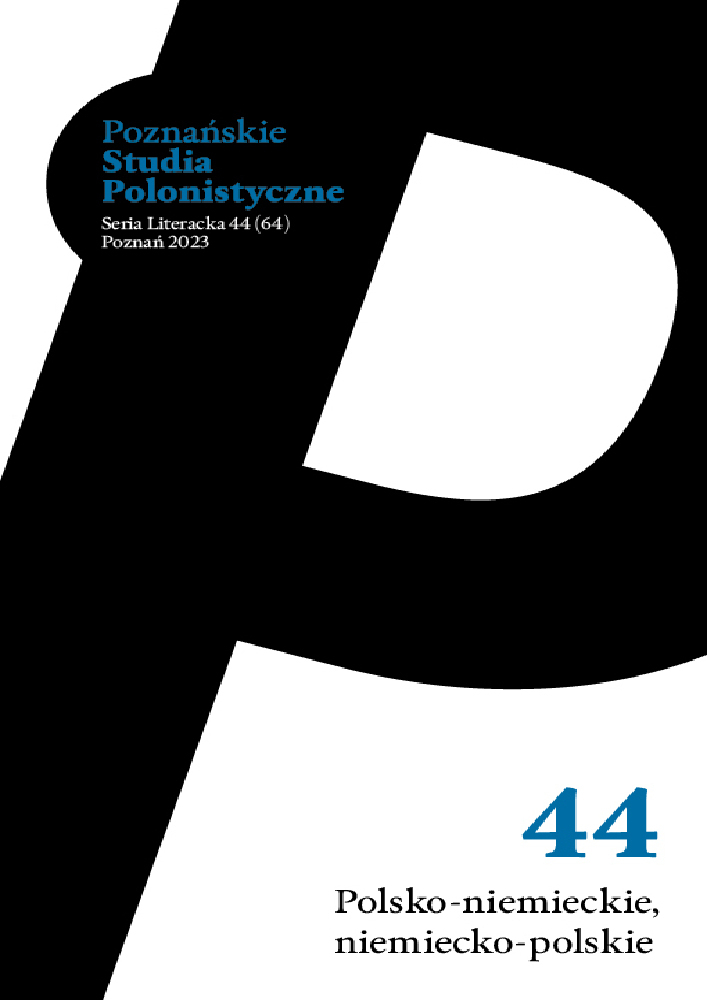Abstract
This article attempts to present the television series as a distinctive text which can persuasively and therefore effectively appeal to contemporary viewers, providing them with an insight into the events of a predefined period of Polish and German history, arousing certain emotions and thoughts or, in a general sense, even making them reflect on the history of both nations. With its attractive storyline based on, among other things, the dramaturgy of the presented events, this type of series can be perceived, to some extent, to be part of contemporary historical narration.
References
Bainville Jacques (1939/1941), Frankreichs Kriegsziel. Les conséquences politiques de la paix, Hanseatische Verlagsanstalt Aktiengesellschaft, Hamburg.
Breuer Lars (2015), Kommunikative Erinnerung in Deutschland und Polen. Täter – und Opferbilder in Gesprächen über den Zweiten Weltkrieg, Springer VS, Wiesbaden,
Craig Gordon A. (1989), Geschichte Europas 1815–1980. Vom Wiener Kongreß bis zur Gegenwart, Verlag C.H. Beck, München.
Ćwiek Henryk (2010), Rotmistrz Sosnowski AS wywiadu Drugiej Rzeczypospolitej, Wydawnictwo Literackie, Kraków.
Erasmus Johannes (1952), Der geheime Nachrichtendienst, Musterschmidt Verlag, Berlin.
Gaddis William (1987), The Art of Fiction No. 101, Gespr. gef. v. Zoltán Abádi-Nagy, „The Paris Review“, Nr 105, S. 54–89, https://tinyurl.com/79k8rsak [Zugang: 6. Dezember 2022].
Gondek Leszek (1975), Wywiad polski w Trzeciej Rzeszy 1934–1939. Zarys struktury, taktyki i efektów obronnego działania wywiadu polskiego w Niemczech hitlerowskich, Wydawnictwo Instytutu Morskiego, Gdańsk.
Hildebrand Klaus (1987), Das Dritte Reich, R. Oldenbourg Verlag, München.
Hoensch K. Jörg (1983), Geschichte Polens, Verlag Eugen Ulmer, Stuttgart.
Konic Andrzej, Regisseur (1992), Pogranicze w ogniu, https://www.filmpolski.pl/fp/index.php?film=123699 [Zugang: 6. Dezember 2022].
Konic Andrzej, Regisseur (1998), Pogranicze w ogniu, DVD, Studio Filmowe Perspektywa.
Kozaczuk Władysław (1977), Bitwa o tajemnice. Służby wywiadowcze Polski i Rzeszy Niemieckiej 1922–1939, Książka i Wiedza, Warszawa.
Laudin Gérard, Mass Edgar (2011), Czy przeszłość można przeżywać jako rzeczywistość wizualną? Rozważania historyka nad przedstawieniem dziejów w kinematografii, in: Stereotypy – Tożsamość – Konteksty. Studia nad polską i europejską historią, Hrsg. Hans Henning Hahn, [Übers. von Izabela Drozdowska-Broering u.a.], Wydawnictwo Poznańskie, Poznań, S. 141–155.
Olick Jeffrey K. (1999), Collective Memory: The Two Cultures, „Sociological Theory“, Bd. 17, H. 3, S. 333–348,
Seewald Berthold (2020), Sie haben sie erstochen, erschossen, die Leichen mit Leibern zugedeckt, https://tinyurl.com/55ts55v3 [Zugang: 6. Dezember 2022].
Sioma Marek (2020), Borderline on Fire – the Film Image of the Polish Inter-War Period as an Element of Public („Pogranicze w ogniu“ – filmowy obraz polskiego dwudziestolecia międzywojennego, jako element dyskursu publicznego), „Res Historica“, Nr 50, S. 483–507,
License
Copyright (c) 2023 Zbigniew Mańke

This work is licensed under a Creative Commons Attribution-NoDerivatives 4.0 International License.
Authors
Authors of texts accepted for publication in „Poznańskie Studia Polonistyczne. Seria Literacka” are required to complete, sign and return to the editor's office the Agreement for granting a royalty-free license to works with a commitment to grant a CC sub-license.
Under the agreement, the authors of texts published in „Poznańskie Studia Polonistyczne. Seria Literacka” grant the Adam Mickiewicz University in Poznań a non-exclusive, royalty-free license and authorize the use of Attribution-NoDerivatives 4.0 International (CC BY-ND 4.0)Creative Commons sub-license.
The authors retain the right to continue the free disposal of the work.
Users
Interested Internet users are entitled to use works published in „Poznańskie Studia Polonistyczne. Seria Literacka” since 2016, for non-commercial purposes only, under the following conditions:
- attribution - obligation to provide, together with the distributed work, information about the authorship, title, source (link to the original work, DOI) and the license itself.
- no derivatives - the work must be preserved in its original form, without the author's consent it is not possible to distribute the modified work, such as translations, publications, etc.
Copyrights are reserved for all texts published before 2016.
Miscellaneous
Adam Mickiewicz University in Poznań retains the right to magazines as a whole (layout, graphic form, title, cover design, logo etc.).
